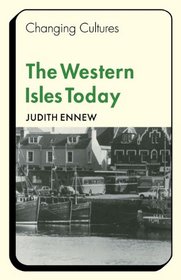Lorelie L. (artgal36) reviewed The Western Isles Today (Changing Culture Series) on + 471 more book reviews
The Western Isles of Scotland appear to the popular imagination as romantic and remote islands where the inhabitants cling to an archaic culture which is barely integrated into modern industrial society. In this book Judith Ennew dispels such myths, and confronts the social problems of an economically depressed region without denying its unique cultural aspects. She traces the history of the Western Isles as a dynamic process, and shows that even the crofting way of life is of recent origin. What is often taken to be an ancient way of life is not a static structure but the ongoing result of the development of capitalism. Its history is as modern as that of any other living pattern within the United Kingdom.
In the first part of this book Dr. Ennew examines the history of land tenure and economy, showing how the islands have been integrated into industrial society since the eighteenth century. In the second half she explores the way of life in the area today, concentrating on the northern island of Lewis. She shows that agricultural practices, political activity and family life are all affected by the conflict between three sets of norms-Gaelic, Puritan and English-and argues that these are not related to the staple sociological divisions between tradition and modernity or State and Community which are so frequently applied in the anthropology of industrial societies. A final chapter examines the future prospects of the islands, demonstrating how the inhabitants are trying to develop a conciousness of their own history with which to combat present social ills.
This book will interest social anthropologists, sociologists, social and economic historians, and social and historical geographers, and will appeal to all non-specialists interested in Scotland and the Highlands today.
In the first part of this book Dr. Ennew examines the history of land tenure and economy, showing how the islands have been integrated into industrial society since the eighteenth century. In the second half she explores the way of life in the area today, concentrating on the northern island of Lewis. She shows that agricultural practices, political activity and family life are all affected by the conflict between three sets of norms-Gaelic, Puritan and English-and argues that these are not related to the staple sociological divisions between tradition and modernity or State and Community which are so frequently applied in the anthropology of industrial societies. A final chapter examines the future prospects of the islands, demonstrating how the inhabitants are trying to develop a conciousness of their own history with which to combat present social ills.
This book will interest social anthropologists, sociologists, social and economic historians, and social and historical geographers, and will appeal to all non-specialists interested in Scotland and the Highlands today.




